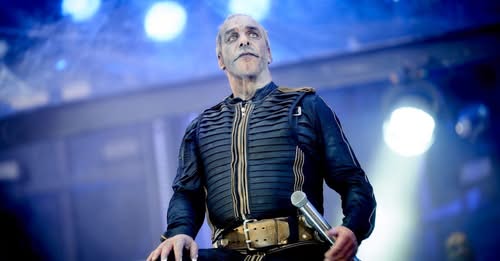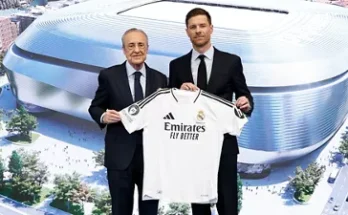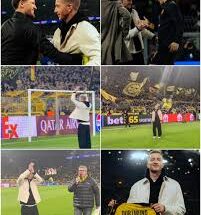It was a crisp autumn Monday afternoon in Berlin when news broke that Till Lindemann, frontman of Rammstein, would host an exclusive autograph night in Friedrichshain. The announcement arrived suddenly, posted on his official Instagram: The date triggered an immediate stir among fans.Many had assumed public appearances by Lindemann were limited to concert tours—but now, here was an intimate signing in a Berlin club, a rare chance to meet the enigmatic figure behind so many seismic stage performances
Friedrichshain’s RAW Gelände is an area with vibrant cultural life—the stretch of graffiti, music venues, industrial charm and repurposed warehouses gives the locale both grit and intimacy. The Astra Kulturhaus, located on that terrain, would be the host. In the weeks leading up to the event, fan forums buzzed with speculation: Would there be restrictions? How many invites? What would be signed? Some worried that the price of the new book Der Rhein, which Lindemann co‑authored with Joey Kelly, might be a barrier—at around 98 €, the hefty tome was intended to be sold and simultaneously signed at the session.
On the afternoon of October 20, a growing crowd gathered near the venue by 15:00, though doors were set to open around 16:00. Fans came from all over—locals, internationals, some with copies of Der Rhein, others with Rammstein albums, posters, or smaller memorabilia. Some wondered if other merchandise would be allowed. The atmosphere was electric: camera phones, whispers, anticipation. Security crews wore discreet black, checking IDs and tickets, ushering fans into lines. Inside, the club’s high ceilings, exposed beams, and moody lighting enhanced the surreal sense of gathering in a space that was part concert hall, part literary salon.
By 16:00, the room was nearly full. A small table sat on a modest stage, flanked by two chairs and a solitary microphone. The floor was partitioned into queue lanes. Lindemann and Kelly, it seemed, would take turns at the signing desk. Behind the scenes, event organizers quietly coordinated, reinforcing that the session was for purchases of Der Rhein—the signed book serving as the key to entry. Some fans whispered that only those who purchased the book would receive priority access, while others speculated that limited exceptions might be made for long‑time devotees carrying rare merch.
When the doors finally opened, the air was thick with hushed excitement. The scent of printed paper, leather covers, camera bags, and lingering tobacco (from outside) blended into a peculiar kind of fan incense. People in black jackets, band tees, and scarves navigated the space carefully, trying to stake their place in line, trading tips on which queue might move faster or where Lindemann might first appear.
At around 16:30, an announcement came over the PA: “Please prepare your items, keep queues orderly, staff will guide you. The signing session begins shortly.” Cameras clicked in the back. Some fans snapped candid shots of the stage, the table, the queue. A subtle hush fell.
Then, amid the controlled tension, Lindemann appeared. Not with a bombastic entrance, but with a quiet, measured stride. He carried with him a stack of books and wore dark clothes—nothing extravagant. Beside him walked Joey Kelly, friend and companion in the river trilogy project. The crowd stirred, murmuring. A few gasps. Phones rose. But Lindemann did not pause dramatically; he took a seat behind the table, greeted the staff, and gave a slight nod. Kelly joined him, and together they began signing.
What followed was a slow, methodical procession of fans. Each got a brief moment at the table. Some handed Lindemann their just‑bought copy of Der Rhein to be inscribed. Others presented older volumes, posters, vinyl, or photographs. A few dared to hand a rare token—an early CD, a program, or something sentimental. Lindemann signed with a practiced hand, sometimes pausing for a brief word, a glance, a nod. Kelly, alternating, signed copies as well, occasionally chatting with fans who dared to speak. There was no performance element; this was a quiet meeting of artist and audience.
In those moments, the aura around Lindemann shifted. On stage he is commanding, theatrical, larger than life; at the table he became human, present, patient. Some fans managed a few words, others just a trembling “Danke.” Others asked for a short dedication or a date. A few asked for photographs; in most cases, these were gently declined or deferred. The rules were clear: signed books only, limited extras, and no impromptu selfies. But the vibe was cordial, respectful.
One fan later recounted over Reddit: “He was in a great mood, signing, messing around, almost flipping over a table—super surreal.” (Reddit) Others in fan forums described how Lindemann sometimes looked up, smiled slightly at the crowd, or dipped his head in quiet acknowledgment. And there was talk—echoed in later accounts—that in past autograph events he had brought theatrical companions. In one notorious signing in Moscow circa 2018, Lindemann entered with a leashed, crawling BDSM gimp accompanying him, a shock to many attendees. (Louder) But this time, there was no such spectacle—only a solemn, focused session centered on literary and artistic exchange.
The queue moved steadily over hours. Fans waited, shifted, whispered to one another, compared the dedications they received, photographed their signed pages, scrolled through social media updates. Outside the main hall, staff monitored crowd flow, escorted late arrivals, gently reminded people of the rules. Some fans lingered, hoping for a second chance or a glance as Lindemann exited. A few brought water bottles or snacks—they expected the session to last several hours.
By early evening, perhaps 18:30 or 19:00, the line had thinned considerably. Lindemann and Kelly continued until the stack of books was nearly done, then paused, stood, and clapped hands in thanks. Lindemann raised his voice: “Vielen Dank, danke schön,” he said, offering his gratitude to those who had waited, traveled, and participated. A subtle ovation broke out—hands clapping, camera flashes. Then Lindemann stood, gathered belongings, and exited through a back corridor. Kelly followed. Staff began ushering remaining fans out, exchanging final words of thanks and reminders about safety.
Afterwards, the crowd lingered outside. People chatted excitedly, compared notes, shared photos of dedications, some leaning against walls with their new signed books held close. A few speculated on whether Lindemann might reappear for a hidden performance or surprise drop. But no such event occurred. The signing night had fulfilled its purpose: to let fans meet and receive a personal inscription from one of metal’s most mythic voices.
In the aftermath, social media lit up. Fans posted images of their signed pages, selfies holding the tome, and firsthand accounts. Hashtags like #LindemannSigning, #DerRheinSession, #FriedrichshainNight trended in fan circles. Speculation ran rampant about whether this club signing would become a template for future events in cities outside Berlin. Interviews emerged forecasting Lindemann’s Meine Welt tour dates, and fans wondered whether similar autograph nights would accompany those tours.
Journalists covering the event noted the unusual intimacy. Lindemann, they wrote, is seldom seen outside of staged performances—and when he is, it’s done on his own terms. The choice to host an autograph night in Friedrichshain, on short notice, in a club setting, was seen as a deliberate gesture to fans: a gesture of closeness, of connection, or perhaps of control over how his public image is mediated. Some commentators framed this as partially promotional—after all, the new book needed to sell—but others saw it as an artist granting access rarely given.
Still, the event did not escape scrutiny. Lindemann over the years has been embroiled in controversy, with accusations and investigations cast against him that continue to linger in public discussion. (Reddit) To some, the signing was also a moment of reckoning: the opportunity to see the man rather than the myth, to engage with his art as he presents it now. A few skeptics watched from the sidelines, wondering if the spectacular aura of Rammstein could be reconciled with the vulnerability of a signing desk.
But for those present, the night became a personal memory. One fan described clutching the book tightly, walking home by night across Friedrichshain’s graffiti‑lined alleys, head buzzing, heart full. Another recounted how lines of light from cell phones glinted against the hardcover edges, how the hum of the crowd outside faded into a personal echo. In small ways, some felt changed—they had held his gaze, had words exchanged, had a moment beyond the roar of stadiums.
In the days following, the autograph night’s impact rippled outward. Collectors cataloged dedications, cross‑checked signatures, debated authenticity. Fan blogs posted transcripts of dedications. Some suggested that future Lindemann events would reduce spontaneous meet‑and‑greets, relying more on curated signing sessions like this one. Others hoped for repeat events in other cities.
This night in Friedrichshain would be remembered not merely as a promotional event, but as a rare intersection of artistry and fan devotion—a moment when a towering figure of industrial metal paused, crossed the barrier, and sat at a table to share a few words and sign a book. In that brief exchange, Lindemann invited his audience not just to witness, but to participate, to hold a piece of his work in their own hands, to inscribe memory in ink. It was, for many, an unforgettable evening.



